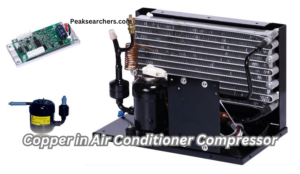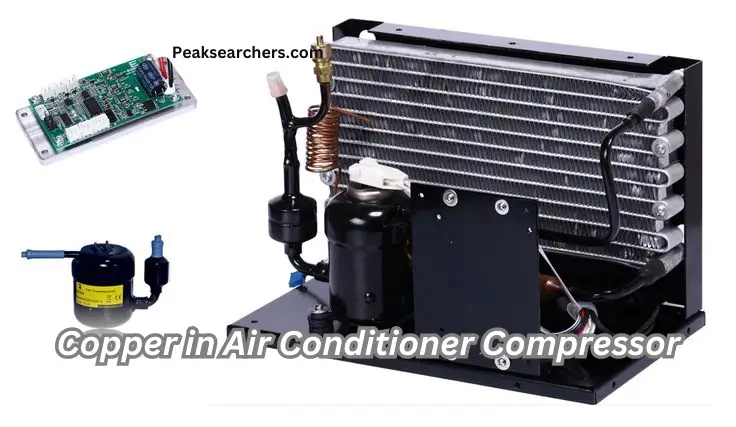How Much Copper is in an Air Conditioner Compressor? A Detailed Guide
Welcome to our comprehensive guide on the amount of copper found in an air conditioner compressor. If you’re curious about the copper content of these essential components in your AC system, you’ve come to the right place. In this article, we will delve into the details and provide you with valuable insights regarding the copper quantity present in air conditioner compressors.

Understanding Air Conditioner Compressors
Before we discuss the copper content, let’s take a moment to understand the role of an air conditioner compressor. An air conditioner compressor plays a crucial role in the cooling process of an AC unit. It is responsible for circulating refrigerant within the system, enabling the transfer of heat from the indoor environment to the outdoor environment.
The Importance of Copper in Air Conditioner Compressors
Copper is widely used in air conditioner compressors due to its exceptional properties. It is an excellent conductor of heat and electricity, making it an ideal material for heat exchange and energy-efficient operation. The copper tubing found in AC compressors allows for efficient heat transfer, facilitating the cooling process.
Copper Coils in Air Conditioner Compressors
Copper coils are commonly found in air conditioner compressors due to their exceptional heat transfer capabilities. The coils, typically made of copper tubing, play a crucial role in dissipating heat generated during the compression process. The copper material facilitates the transfer of heat from the refrigerant to the surrounding environment, allowing for efficient cooling.
Copper Tubing in Air Conditioner Compressors
In addition to the coils, copper tubing is widely used in air conditioner compressors. The tubing serves as the conduit through which the refrigerant flows, enabling the compression and expansion cycles that are essential for the cooling process. Copper tubing is preferred for its durability, flexibility, and resistance to corrosion, making it an ideal choice for this critical application.
Copper Motor Windings in Air Conditioner Compressors
The motor within an air conditioner compressor requires copper windings to ensure optimal performance. Copper’s electrical conductivity and high melting point make it an ideal material for motor windings, as it allows for efficient electricity flow and helps prevent overheating. These copper windings enable the motor to run smoothly, providing the necessary power to drive the compressor.
Copper Content in Air Conditioner Compressors
The copper content in air conditioner compressors can vary depending on the type and size of the unit. Generally, residential air conditioners contain copper tubing with a diameter ranging from 1/4 inch to 3/8 inch. These copper tubes are typically made from high-quality copper alloy, ensuring durability and optimal performance.
To give you a rough estimate, an average residential air conditioner compressor can contain approximately 4 to 8 pounds of copper. However, it’s important to note that this can vary based on the specific model and manufacturer.
Factors Affecting Copper Content
Several factors can influence the copper content in air conditioner compressors. Some of these factors include:
- Size and capacity of the air conditioner: Larger units often require more copper tubing to handle the increased cooling capacity.
- Efficiency standards: Advancements in technology have led to the development of more efficient air conditioners, which may use less copper while still maintaining excellent performance.
- Design and construction: The design and construction of the compressor, including the layout of the tubing and components, can affect the copper content.
Environmental Considerations
As copper is a valuable resource, it’s worth considering the environmental impact associated with its usage in air conditioner compressors. Recycling initiatives have gained prominence, aiming to minimize waste and maximize the reuse of valuable materials. When disposing of old air conditioner units, it’s advisable to explore recycling options to help reduce the overall environmental impact.
Benefits of Copper in Air Conditioner Compressors
- Excellent Heat Transfer: Copper’s high thermal conductivity allows for efficient heat transfer, ensuring optimal cooling performance in air conditioner compressors. This property enables the rapid absorption and dissipation of heat, resulting in more effective cooling of the indoor environment.
- Corrosion Resistance: Copper has inherent corrosion-resistant properties, making it an ideal material for air conditioner compressors. This resistance to corrosion helps prolong the lifespan of the compressor, reducing the risk of leaks or malfunctions.
- Durability: Copper is a robust and durable material, capable of withstanding the demanding conditions and pressures within an air conditioner compressor. Its strength ensures that the copper tubing maintains its structural integrity, even in high-pressure situations.
- Energy Efficiency: The exceptional thermal conductivity of copper contributes to energy-efficient operation in air conditioners. By facilitating rapid heat transfer, copper helps reduce the workload on the compressor, leading to lower energy consumption and cost savings.
Copper Recycling and Sustainability
As sustainability becomes an increasingly important consideration, it’s crucial to address the environmental impact of copper usage. Copper is a highly recyclable material, and recycling initiatives can significantly reduce the need for extracting new copper from the Earth’s resources. By opting for recycled copper or participating in copper recycling programs, you can contribute to a more sustainable and environmentally friendly approach to air conditioning.
Recycling copper not only conserves natural resources but also helps reduce energy consumption and greenhouse gas emissions associated with copper production. It’s worth exploring local recycling centers or contacting HVAC professionals who specialize in responsible disposal and recycling of air conditioning components.
Considerations for Air Conditioner Maintenance
To ensure the longevity and efficient operation of your air conditioner compressor, regular maintenance is essential. Here are some tips to keep in mind:
- Scheduled Inspections: Arrange for routine inspections by qualified HVAC technicians to assess the condition of the copper tubing and other compressor components. Regular inspections can help detect any potential issues early on and prevent major problems from arising.
- Cleaning: Regularly clean the exterior surfaces of the air conditioner compressor, including the copper tubing. Dust, debris, or dirt accumulation can hinder heat transfer and negatively impact the compressor’s performance. Use a soft cloth or brush to gently clean the surfaces, avoiding any harsh chemicals that may damage the copper.
- Air Filter Maintenance: Clean or replace the air filters in your air conditioning system according to the manufacturer’s recommendations. Clogged filters restrict airflow, which can increase the workload on the compressor and impact its efficiency.
- Professional Servicing: Consider scheduling professional servicing at least once a year. During servicing, technicians will inspect, clean, and optimize the entire air conditioning system, including the compressor and copper tubing.
By following these maintenance practices, you can help ensure the longevity and efficient operation of your air conditioner compressor, benefiting from its copper components.
Also Read: Why Is My Air Conditioner Leaking Water? A Comprehensive Guide
FAQ’s
How much copper is in an AC radiator?
AC radiators contain a significant amount of copper, which is essential for their construction and performance. Copper is chosen for its excellent thermal conductivity and corrosion resistance. The tubing and fins in AC radiators are typically made of copper, allowing for efficient heat transfer and enhanced cooling.
Copper tubing facilitates the flow of refrigerant, while copper fins increase the surface area for better heat dissipation. The exact amount of copper can vary depending on the radiator’s size and design. However, copper plays a vital role in optimizing heat transfer and ensuring the durability of AC radiators.
Is an AC compressor made of copper?
Yes, an AC (air conditioning) compressor typically contains copper components. Copper is commonly used in the construction of AC compressors due to its excellent thermal conductivity and corrosion resistance properties.
The compressor is a vital part of an AC system that compresses and circulates refrigerant to facilitate the cooling process.
While other materials may also be used in the construction of AC compressors, copper is widely favored for its effectiveness in heat transfer and its durability.
How much copper is in a refrigerator?
The amount of copper in a refrigerator can vary depending on the model, size, and design of the refrigerator. Copper is used in various components of a refrigerator, such as the compressor, condenser, and refrigerant tubing. These components are typically made of copper or contain copper coils.
On average, a refrigerator may contain around 0.5 to 2 kilograms (1 to 4.5 pounds) of copper. However, it’s important to note that this is just an estimate and can vary significantly. The amount of copper used in a refrigerator is influenced by factors like the size of the unit, the specific design, and the manufacturer’s choices for materials and components.
It’s worth mentioning that modern refrigerators are designed with energy efficiency in mind, and manufacturers often strive to minimize the use of materials like copper to reduce costs and environmental impact.
Also Read: Why Is My Air Conditioner Blowing Hot Air? A DIY Guide
Conclusion
In conclusion, copper is a vital component in air conditioner compressors, facilitating efficient heat transfer and contributing to the overall performance of the cooling system.
While the exact amount of copper can vary based on the size, capacity, and model of the unit, residential air conditioner compressors typically contain around 4 to 8 pounds of copper.
By understanding the role of copper in air conditioner compressors, you can make informed decisions and appreciate the importance of this essential element in your cooling system.


